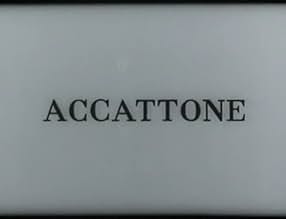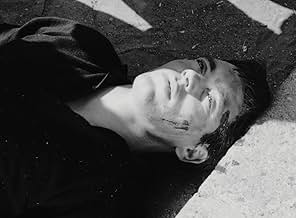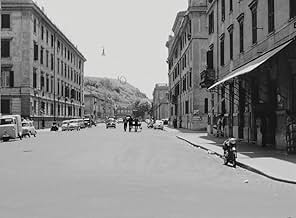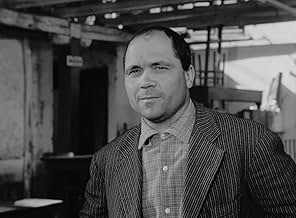CALIFICACIÓN DE IMDb
7.6/10
11 k
TU CALIFICACIÓN
Un proxeneta se encuentra en una encrucijada cuando su prostituta es encarcelada.Un proxeneta se encuentra en una encrucijada cuando su prostituta es encarcelada.Un proxeneta se encuentra en una encrucijada cuando su prostituta es encarcelada.
- Dirección
- Guionistas
- Elenco
- Nominada a1 premio BAFTA
- 3 premios ganados y 4 nominaciones en total
Opiniones destacadas
Pasolini's first film "Accatone" is exactly as one would expect a typical Pasolini film to be: wreathed in raw violence, and shot with a brilliant sense of poetic slash brutal realism, reminiscent of the neo-realism era, and perhaps, if not for sure, a semi-autobiographical portrait of life in the streets of Rome's peripheries. "Accatone" is, at its best, a chunk of life, which Pasolini managed to extract not as it initially was, but dramatically filtered through his own personal lyrical gaze. Gangs, prostitutes, lies and deceit lie in this film's core. A sense of irresponsible opportunism is seen in this film, almost no regrets for the past and no fears for the future. In fact, the movie's tragic hero, Vittorio Accatone, is a dark alter-ego of yet another favored Italian movie character, embodied only a year before by Marcello Mastroianni in "La Dolce Vita". Perhaps, in this case, Accatone was not a party animal journalist who sought ephemeral pleasure in social middle-class gatherings and women, but the spirit is, by itself, maintained astonishingly faithfully: Accatone is no longer a protagonist in Pasolini's movie, doomed to descend lower and lower in social class, losing both his dignity, his social acceptability and his profound "style", but a symbol, a metaphor for Pasolini's own political beliefs. Under this figure of a brute, behind the otherwise repelling image of a short dirty man with a sly smile and a peculiar walk, lies the failure of post war Italian government, a government which, according to this movie's subtext, strove so hopelessly to attain social and economical success for Rome's population, and somehow neglected or marginalized Rome's peripheries, causing people like Accatone and his girlfriends to result in prostitution and theft. A kind of pretension and make-belief well being which was also visible, at the time, in America. Yes, Accatone is the result of this American Dream's pastische.
Just to start with, Accattone was not filmed in Naples but in Rome. Someone might have brought to that understanding by some Neapolitans gangsters that appear at some point in the movie As for the "ruins" that scatter the landscape, they are mostly buildings that will soon replace the barracks such as the one in which Accattone lives, or the Acquedotto Felice, an ancient Roman aqueduct that runs close to Prenestina and Casilina, two Roman suburbs, that you can see in Mamma Roma as well. Franco Citti, the character of Accattone, perfectly embodies the roman lumpenproletariat of the time: idle, fatalistic and desperate. Pasolini met Franco's brother Sergio, a plasterer, hanging around Cinecittà in 1951. He introduced him to his brother Franco that became Pasolini's dialectical adviser for Accattone, Mamma Roma and his book "Ragazzi di vita"; his "living vocabulary" as he called him. Indeed, Pasolini interests for dialects and slangs (Roman is not really a dialect anymore but a slang) was not disappointed. The dialogues between the characters are full of fantasy: rude and in some way reminiscent of their peasant past. A must see if you're interested in Neorealism and in the "ways of the underworld lumpenproletariat". Someone connected this movie with Bunuel's "Los Olvidados". I definitely agree.
In the poor periphery of Rome of the 60's, the despicable caftan Vittorio "Accattone" Cataldi (Franco Citti) is maintained by the hooker Maddalena (Silvana Corsini), spending the time with his useless idle friends. When the prostitute is arrested for perjury, the pimp "Accattone" has nobody to support him, but he seduces the naive worker Stella (Franca Pasut) and she becomes a whore. However, Accattone has a crush on Stella and decides to find a way to support her, with tragic consequences.
"Accattone" is the stunning debut of the great director Pier Paolo Pasolini. He returns to the theme of the misery of Italy in the postwar, explored in many Italian neo-realist movies such as Fellini's "Le Notti di Cabiria" (1957) and Visconti's "Rocco e i Suoi Fratelli" (1960), and magnificently shows the lifestyle of great part of the population in Italy, its lower class, with lack of perspective, starvation, prostitution and unemployment. Considering that this movie is also the debut or the beginning of the career of most actors and actresses, it is amazing how Pasolini was able to make such gem. My vote is nine.
Title (Brazil): "Accattoni Desajuste Social" ("Accattoni Social Maladjustment")
"Accattone" is the stunning debut of the great director Pier Paolo Pasolini. He returns to the theme of the misery of Italy in the postwar, explored in many Italian neo-realist movies such as Fellini's "Le Notti di Cabiria" (1957) and Visconti's "Rocco e i Suoi Fratelli" (1960), and magnificently shows the lifestyle of great part of the population in Italy, its lower class, with lack of perspective, starvation, prostitution and unemployment. Considering that this movie is also the debut or the beginning of the career of most actors and actresses, it is amazing how Pasolini was able to make such gem. My vote is nine.
Title (Brazil): "Accattoni Desajuste Social" ("Accattoni Social Maladjustment")
Accattone is a Neo-Realist examination of slovenly irresponsibility, tastelessness and self-pity - you know, the fun stuff. Its principal characters, a group of young upwardly-immobile Roman males, are almost uniformly repulsive, a lot of chest-baring half-savages whose idea of fun is luring a whore to a deserted spot and beating her to within an inch of her life. Its hero, Accattone, is played by one of the more unpleasant actors in the history of film, a fellow named Franco Citti, who manages to single-handedly set the entire nation of Italy back about two-hundred years. It is a film of almost relentless despair, depicting a Rome so desolate and squalid, so bereft of hope, that it seems almost medieval. In the hands of almost any director the movie would be unbearable - either unbearably sentimental or unbearably grim - but with Pasolini at the helm it is merely honest.
It isn't Pasolini's best film by a long way, but it may be the clearest example of what made the director so special - his ability to probe around the most revolting recesses of the human condition without seeming sensationalistic, exploitive or crass. It would be easy to go one of two directions with a character like Accattone, a lazy two-bit pimp with a son by a woman who wants nothing to do with him: the sentimental route or the grotesque. One could easily imagine De Sica, the soft-heart of Neo-Realism, turning Accattone into a sympathetic, misunderstood Everyman. And one could just as easily imagine Fellini, the most uptight director maybe in history, transforming the character into a universal symbol of societal decay. Pasolini, neither a sentimentalist nor a moralist, sees Accattone not as a sympathetic character nor as a symbol. The least judgmental director maybe ever, Pasolini conceives his characters entirely in terms of their outward behavior, and not in moral terms. He neither psycho-analyzes nor seeks to "understand" his characters. He simply presents them as they are, warts and all.
It was always the purpose of Neo-Realism to present life as it was lived, not life as it was imagined by screenwriters, directors and actors, and there are few more successful ventures in this regard than Accattone. The film's main triumph is in its atmosphere. The Roman days have never seemed so sun-bleached, so arid and oppressive; its nights never so mysterious, so full of inexpressible longing (not even in Henry James). The characters seem bound to this world in a palpable way, their faces (shot by expert cinematographer Tonino Delli Colli) mirroring the desolation, the hopelessness, the strangeness of their surroundings. The movie's physicality, as always with Pasolini, is striking. But pure physical vigor, pure atmosphere isn't enough. Where Pasolini comes up short is in assembling the parts of his film into something with real emotional breadth. His first feature shows him already on his way to being a master of the image, but also shows that he had a lot to learn about being a master of cinematic rhythm. The strange blend of primitivism and modernism is already there but the command is not. It's a film that works well in the moment but feels thin as a whole. It's a triumph of Neo-Realist technique but it only half-succeeds as a film.
Half-successful Pasolini is still better than the best most directors have to give. If you can portray a character as repulsive, as boorish and ego-maniacal as Accattone - a character with few if any redeeming features - for two hours without alienating your audience...well, chalk one up for the director who can do that. Especially one who manages the trick without resorting to sentimental contrivance or the kind of false significance people like Fellini always tried to drum up by filling their movies with obvious symbols, the sorts of things art-film zombies love because it gives them a chance to show their alleged smarts. Pasolini never flatters his audience but he never sneers at them either. He attempts to neither ingratiate himself with the public nor antagonize it in the manner of certain self-important avant-gardists. The best artists look for what interests them in a piece of material, not worrying whether their ideas, their approach, their style is accessible to the public at large, or critics, or scholars, or their grandmothers or anyone else. Accattone shows Pasolini on the road that would make him one of cinema's best directors - a road traveled by precisely one person, Pasolini himself.
It isn't Pasolini's best film by a long way, but it may be the clearest example of what made the director so special - his ability to probe around the most revolting recesses of the human condition without seeming sensationalistic, exploitive or crass. It would be easy to go one of two directions with a character like Accattone, a lazy two-bit pimp with a son by a woman who wants nothing to do with him: the sentimental route or the grotesque. One could easily imagine De Sica, the soft-heart of Neo-Realism, turning Accattone into a sympathetic, misunderstood Everyman. And one could just as easily imagine Fellini, the most uptight director maybe in history, transforming the character into a universal symbol of societal decay. Pasolini, neither a sentimentalist nor a moralist, sees Accattone not as a sympathetic character nor as a symbol. The least judgmental director maybe ever, Pasolini conceives his characters entirely in terms of their outward behavior, and not in moral terms. He neither psycho-analyzes nor seeks to "understand" his characters. He simply presents them as they are, warts and all.
It was always the purpose of Neo-Realism to present life as it was lived, not life as it was imagined by screenwriters, directors and actors, and there are few more successful ventures in this regard than Accattone. The film's main triumph is in its atmosphere. The Roman days have never seemed so sun-bleached, so arid and oppressive; its nights never so mysterious, so full of inexpressible longing (not even in Henry James). The characters seem bound to this world in a palpable way, their faces (shot by expert cinematographer Tonino Delli Colli) mirroring the desolation, the hopelessness, the strangeness of their surroundings. The movie's physicality, as always with Pasolini, is striking. But pure physical vigor, pure atmosphere isn't enough. Where Pasolini comes up short is in assembling the parts of his film into something with real emotional breadth. His first feature shows him already on his way to being a master of the image, but also shows that he had a lot to learn about being a master of cinematic rhythm. The strange blend of primitivism and modernism is already there but the command is not. It's a film that works well in the moment but feels thin as a whole. It's a triumph of Neo-Realist technique but it only half-succeeds as a film.
Half-successful Pasolini is still better than the best most directors have to give. If you can portray a character as repulsive, as boorish and ego-maniacal as Accattone - a character with few if any redeeming features - for two hours without alienating your audience...well, chalk one up for the director who can do that. Especially one who manages the trick without resorting to sentimental contrivance or the kind of false significance people like Fellini always tried to drum up by filling their movies with obvious symbols, the sorts of things art-film zombies love because it gives them a chance to show their alleged smarts. Pasolini never flatters his audience but he never sneers at them either. He attempts to neither ingratiate himself with the public nor antagonize it in the manner of certain self-important avant-gardists. The best artists look for what interests them in a piece of material, not worrying whether their ideas, their approach, their style is accessible to the public at large, or critics, or scholars, or their grandmothers or anyone else. Accattone shows Pasolini on the road that would make him one of cinema's best directors - a road traveled by precisely one person, Pasolini himself.
10NYLux
This is still a masterpiece of a film you can not afford not to see if you like Pasolini. "Accattone" is the directorial debut of the Italian neo-realist, Pier Paolo Pasolini, but by a strange coincidence it ended up being the very last of all his movies that I saw. I had seen everything he ever did, including short films by the time I got to "Accatone" and still found it masterful.
Franco Citti stars as the title character, he is a handsome pimp in Rome's post-war lower depths, with an endearing face that speaks volumes of his street-wise upbringing in the slums. To those unaccustomed with Southern Italian culture the way he spends his days with the other local pimps, playing cards and being lazy may seem vile, but it is actually a well grounded tradition, as is also his support of the entire family of his imprisoned friend, Ciccio, who depend on him for survival. He is obviously a fellow mobster, and their code of honor is at stake when Accatone discovers that he is in prison as a result of his whore, Maddalena, played by Silvana Corsini, who denounced Ciccio to the authorities. Even though she is recovering from a broken leg, Accatone forces her to go on the streets, where she is used, beaten and abandoned by Accatone's pals after he tells them the story, then she is found by the police and arrested. Accattone nearly starves to death from the total lack of income, he even sells all his jewelry to get by. He tries to reunite with his wife, with whom he has fathered at least one child, but she sees through his seduction act and her virile, beautiful brother beats up Accatone in an intense erotically-charged scene that seems to simulate sexual assault as much as violence between the men.
After meeting the innocent and beautiful Stella, (Franca Pasut) he is smitten and tries to get a job, so he can support her and his family but he is not accustomed to hardship and has the lack of patience that is typical of spoilt types that have never been trained to work does not make the job last for very long.
Never have I seen a more humane, direct and simple depiction of the tragic life of these undesirables of society. Pasolini is a master painter narrating with a few gestures all their hardship and suffering. Even getting a plate of food in this world is a memorable accomplishment. We see the whole setting as a sideline of modern society's inability to function properly. The 'corrections' by the police seem to be the most unjust of all, and Pasolini presents this panorama of human failing as an allegory of human struggle and spiritual redemption.
Franco Citti stars as the title character, he is a handsome pimp in Rome's post-war lower depths, with an endearing face that speaks volumes of his street-wise upbringing in the slums. To those unaccustomed with Southern Italian culture the way he spends his days with the other local pimps, playing cards and being lazy may seem vile, but it is actually a well grounded tradition, as is also his support of the entire family of his imprisoned friend, Ciccio, who depend on him for survival. He is obviously a fellow mobster, and their code of honor is at stake when Accatone discovers that he is in prison as a result of his whore, Maddalena, played by Silvana Corsini, who denounced Ciccio to the authorities. Even though she is recovering from a broken leg, Accatone forces her to go on the streets, where she is used, beaten and abandoned by Accatone's pals after he tells them the story, then she is found by the police and arrested. Accattone nearly starves to death from the total lack of income, he even sells all his jewelry to get by. He tries to reunite with his wife, with whom he has fathered at least one child, but she sees through his seduction act and her virile, beautiful brother beats up Accatone in an intense erotically-charged scene that seems to simulate sexual assault as much as violence between the men.
After meeting the innocent and beautiful Stella, (Franca Pasut) he is smitten and tries to get a job, so he can support her and his family but he is not accustomed to hardship and has the lack of patience that is typical of spoilt types that have never been trained to work does not make the job last for very long.
Never have I seen a more humane, direct and simple depiction of the tragic life of these undesirables of society. Pasolini is a master painter narrating with a few gestures all their hardship and suffering. Even getting a plate of food in this world is a memorable accomplishment. We see the whole setting as a sideline of modern society's inability to function properly. The 'corrections' by the police seem to be the most unjust of all, and Pasolini presents this panorama of human failing as an allegory of human struggle and spiritual redemption.
¿Sabías que…?
- TriviaThis was Bernardo Bertolucci's first work in movies. He was an assistant director.
- ErroresThe shadow of the camera is clearly visible on Accattone's shirt when he walks away towards the camera after the fight with Ascenza's Brother.
- Citas
Vittorio "Accattone" Cataldi: Call me Accattone. There are lots of Vittorios but I'm the only Accattone.
- Versiones alternativasThe VHS and DVD versions produced by Water Bearer Films are listed as running 116 minutes, suggesting that this print is four minutes shorter than the original release.
- ConexionesEdited into Red Italy (1979)
- Bandas sonorasSt Matthew Passion
Composed by Johann Sebastian Bach
Selecciones populares
Inicia sesión para calificar y agrega a la lista de videos para obtener recomendaciones personalizadas
- How long is Accattone?Con tecnología de Alexa
Detalles
Taquilla
- Total a nivel mundial
- USD 2,865
- Tiempo de ejecución1 hora 57 minutos
- Color
- Mezcla de sonido
- Relación de aspecto
- 1.37 : 1
Contribuir a esta página
Sugiere una edición o agrega el contenido que falta

Principales brechas de datos
By what name was Accattone, un muchacho de Roma (1961) officially released in India in English?
Responda































